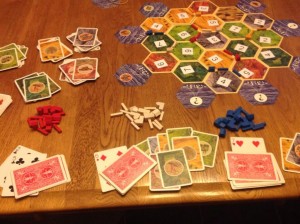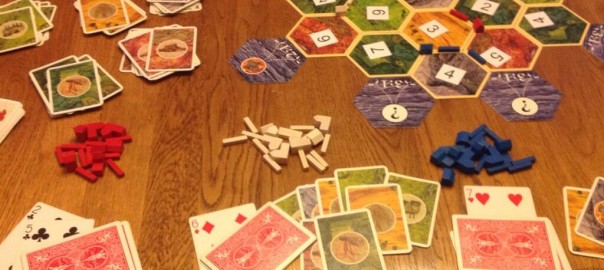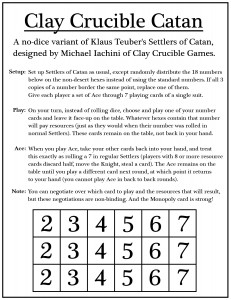Edit 8/2/2014: Thanks to user shendrite on reddit, I’ve changed the name of this variant from Clay Crucible Settlers to the much more alliterative Clay Crucible Catan.
Today I’m sharing a simple rules variant for Settlers of Catan that I designed, called Clay Crucible Catan.
Download Clay Crucible Catan here (1 page PDF)
I’m a big fan of Klaus Teuber’s Settlers of Catan. It’s not the first modern board game I played (that would be Citadels, believe it or not, in its translation-sheet-needed form of Ohne Furcht und Adel). But when our gaming friends introduced my wife and me to Settlers, we fell in love with the game. It’s still a big hit for introducing new gamers to the hobby in our house.
One complaint that seasoned gamers sometimes have about Settlers of Catan is that the dice create too much randomness. A smart player who builds settlements on hexes with numbers like 5 and 6 and 8 and 9 should get lots of resources because those numbers should be rolled a lot… but sometimes the dice roll a streak of 3s, and weird things happen.
The publisher of the game introduced a tool to help prevent this outcome – a deck of 36 cards that reflect the “correct” distribution of each number that can be rolled on a pair of 6-sided dice. If you draw from this deck without replacing the cards you’ve drawn, you eliminate the possibility of a crazy “hot streak” for any number.
I think that’s a neat product. However, I wanted to turn resource production into an interesting decision. Rather than rolling dice or drawing a random card to decide which hexes produce resources each turn, I wanted players to have some decision-making power over production.

The rules for Clay Crucible Catan are simple:
- Replace the normal number circles with the numbers in the attached document (2-7, each appearing 3 times).
- Deal the numbers out randomly, with the one caveat that you can’t have all three copies of a number surrounding the same point (just switch the last copy out for another number).
- Give each player seven playing cards from the same suit, Ace through 7.
- On your turn, instead of rolling dice, you choose one of your playing cards and put it on the table face up. The number you play is the number whose hexes produce resources this round. Leave that playing card on the table.
- When your turn comes around again, you’ll play another one of your playing cards. Note that whatever numbers you’ve played before are still face-up on the table, so you can’t play those numbers again.
- If you decide to play your Ace, this activates the knight/robber just as in regular Settlers rules, with one extra bit: You also get to pick up the playing cards you’ve previously played and put them back in your hand for future use.
- When you play the Ace, you leave it on the table. When you play a different card next turn, you get your Ace back in your hand (so you can’t play your Ace in back to back turns).
- Note that, since you choose when to play your Ace, you can know how many cards are in everyone’s hand (including yours) when the knight is activated.
- Feel free to talk to the other players about which number to play. For instance, you could say, “Hey, if I play my 4, you’ll get two bricks; if I do that, would you trade me one of them for one grain?” Of course, these negotiations aren’t binding, so the person could change their mind after you decide which number to play. (You can use binding negotiations at your table if you prefer.)
The one-page PDF contains these rules (condensed) plus number squares you can cut up to use with your Settlers game (I recommend printing on card stock).
So far I’ve found this to be a fun variant for Settlers of Catan. I wouldn’t recommend it for new players, since the extra layer of decision-making makes Clay Crucible Catan a bit harder for people who don’t play games. But for gamers who prefer a bit less randomness in their Settlers game, this variant is a good fit.
Please let me know if you try this variant with your group – I would love to hear about it! You can leave a comment here, or email me at ClayCrucible@gmail.com.
Michael Iachini – Clay Crucible Games


I forgot to email you back about this!
The main point was that the potential to have HALF of the turns be robbers (vs the expected value of 1/6 in the original game) raises some red flags.
If you want to set up and play via Skype, let me know!
So far in testing, I have not found it to be the case that players play the robber every chance they get, not by a long shot. Keep in mind that you only get one resource when you play your Ace, and it’s uncertain what it will be. If you play another card, you know exactly what you will get, and it may well be multiple resources.
I’m going to keep an eye on this as I play more with these rules, and it’s possible that I need a rule that says, for instance, you don’t get your Ace back until you’ve played at least 2 or 3 other cards. But I don’t expect that will be necessary.
Hello!
I found you from Reddit and I’ve just subscribed to your RSS feed! I love variants & house rules, so I’m eager to try yours out. Thanks for developing and posting it!
-Drew
Hi, I just tried this with my wife and kids. I love the non-randomness of your version. Thank you so much! Have you tried it with 5-6 players?
-Craig
Craig – I’m so glad to hear that you had fun with this variant! I haven’t personally tried it with 5-6 players, no. You would need to add extra numbers for the extra hexes, and I don’t think it will divide quite evenly – you would end up with, for instance, more hexes with 3 than with 6 or something like that. But I don’t think that would be a problem.
If you try it, let me know how it goes!